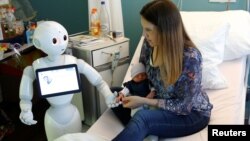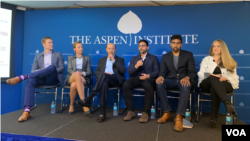From helping doctors make diagnostic decisions to preventing disease outbreaks, artificial intelligence (AI) brings excitement in improving global health while posing serious privacy concerns, experts have said.
At a recent launch event of a USAID report on finding the right AI use cases in global health at the Aspen Institute’s Washington, DC office, a panel of AI experts shared their experiences of harnessing AI-powered analysis, prediction and recommendation systems to attempt to assist the effort to solve global health issues.
However, despite all the new possibilities, the experts stressed that AI, like all technologies, will not be a magic pill that can solve every problem in global health. Instead, the powerful technology will help streamline healthcare provision, they said.
AI in Diagnostics
Sunil Wathwani, who founded Wadhwani Initiative for Sustainable Healthcare in India, said he wants to use AI and machine learning to improve the quality of life of the bottom three billion people who are suffering from poor healthcare.
“By using smartphones, by using AI algorithms, by using ultrasound, by taking a bunch of risk factors that different women might be exposed to, and using algorithms based on those varieties of risk factors to really identify out of all of these millions of women who are pregnant, which ones are likely to have a difficult pregnancy. Of those what are the right actions and the right interventions to take to make sure that we protect the mother’s life at child-birth and we protect that child’s life?” Wathwani told VOA Khmer.
The founder of this healthcare-for-the-poor foundation also suggests another use of AI in disease surveillance that gives better predictive information on when outbreaks might occur.
“The biggest infectious disease in the world today is Tuberculosis. It kills close to 2 million people every year, more than Malaria and HIV combined. At our institute, we are using AI to detect TB earlier in patients so that effective treatment can be given. We are using AI to predict which patients are likely to fall off that treatment, so again we can take intervention ahead of time,” Wathwani said.
Other companies, like London-based Babylon Health, are using AI to provide patients much better and quicker access to information to guide their own healthcare decision-making, even if they are in the most remote settings.
“If you are a patient who is sick with some sort of symptoms, the chatbots then can ask you questions to understand what the underlying condition is. Based on that they can triage you to say ‘okay this is serious. You should probably go and speak to a GP [general practitioner] or family healthcare practitioner, or you should go to the emergency department,’” Saurabh Johri, chief scientist at Babylon Health, told VOA Khmer.
“And beyond that, we are making predictions about the users’ long-term risks of developing chronic health conditions,” Johri added.
Medical Intelligence
While there is a tendency to think about using AI for clinical practices that involve contact with patients and patients being able to interact with virtual doctors, Mark Peterson, senior program officer at the Gates Foundation, said that there is also an exciting area in building medical data infrastructure with AI that the Gates Foundation is ready to fund.
“An example might be using machine learning for digitizing health records,” Peterson said.
“One of the programs that the Gates Foundation funds is using machine learning [and] applying that to satellite imagery to get very granular, high resolution estimates of populations, so if you want to know how many doses of vaccines you send to that particular village, but that country has not conducted a census for 20 years, you can start using AI and a machine learning-enabled algorithm to get a better sense of that,” he added.
Using AI to build medical databases is profoundly important in developing the knowledge of health workers worldwide, according to the experts. The Human Diagnosis Project, a company based in San Francisco, has built an AI-powered data system that 20,000 physicians and other medical professionals from about 80 countries have contributed to building as they create and solve clinical cases.
“What is really powerful [is that] as physicians are solving these cases, we are developing the first quantitative measure of clinical reasoning,” said Jay Komarneni, founder and chair of the Human Diagnosis Project.
Threats to Privacy
But using AI to build medical databases means collecting and using the personal medical data of millions of patients around the world. The experts agreed that this presents serious privacy concerns.
“If you’re just going to take these people’s data and ship it overseas, then are they just an end product or investors’ investment really? Then, that arguably dehumanizes them further,” said Neillan Baptiste, who asked the panelists about how to use AI without exploiting patients’ privacy.
“Yes, we give them healthcare, and that is obviously very important. But at the same time, they need to have access to that data and they need to have a say, a majority of say in fact, in how it is used,” Baptiste added.
The 40-page report on defining the collective path forward for AI in Global Health, published by USAID in partnership with the Rockefeller Foundation and the Gates Foundation, lays out the “game-changing” potential of AI in improving healthcare around the world, especially in underserved communities. Yet, experts have warned to proceed with caution.
“Make sure that we do this well. We bring in a sense of both do no harm, but also bring in a sense of social justice in how we think about using data very effectively and ethically,” noted Wendy Taylor, fellow at the Rockefeller Foundation.





